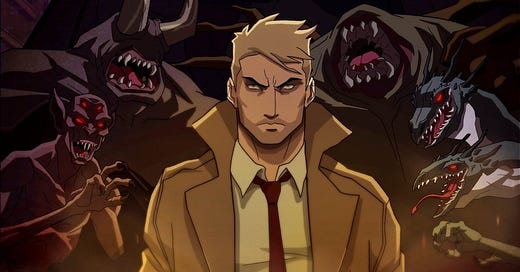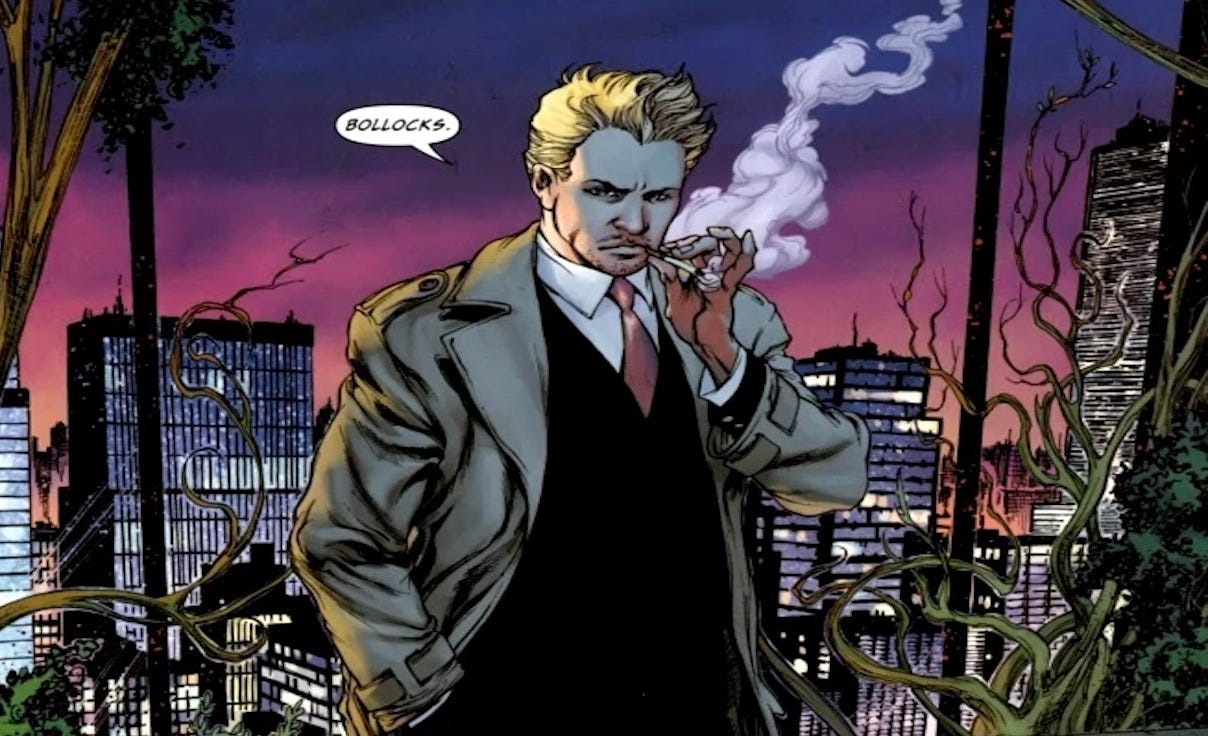John Constantine: The Antihero Mage of the DC Universe
John Constantine, the trench-coat-wearing, chain-smoking occult detective, stands out in the DC Universe as one of the most morally complex characters.
With his sharp wit, vast knowledge of the occult, and knack for manipulating those around him, Constantine has become a beloved antihero who often operates in the shadows, dealing with the mystical threats that few others dare to confront. Known for his self-destructive tendencies and questionable decisions, John Constantine embodies the concept of a flawed hero whose greatest strengths are often overshadowed by his personal demons.
The Origins of John Constantine: From Punk Rock to Occult Hero
John Constantine made his first appearance in The Saga of the Swamp Thing #37 (1985), created by the legendary writer Alan Moore. Constantine was initially created as a supporting character who could offer a cynical contrast to the confusion and innocence of the Swamp Thing. He was said to be modeled after the musician Sting, with a scruffy appearance and an attitude to match. Constantine’s appeal as a character quickly grew, leading to the launch of his own series, Hellblazer in 1988, which would become the longest-running title under DC’s Vertigo imprint.
Raised in Liverpool, England, Constantine’s early life was marred by tragedy and darkness. A self-taught magician with a punk rock attitude, Constantine meddled in the occult from a young age, seeking both power and a way to escape his troubled upbringing. His first major brush with magic resulted in a catastrophe known as the Newcastle Incident, where a failed exorcism led to the death of a young girl named Astra and her subsequent damnation to Hell. This event haunted Constantine throughout his life, setting the stage for his ongoing struggles with guilt and the consequences of his actions.
Neither Hero Nor Villain: The Morally Ambiguous Constantine
What makes John Constantine such an intriguing character is his refusal to fit neatly into the category of hero or villain. He often operates with his own set of rules and morals, doing whatever it takes to achieve his goals, even if it means lying, cheating, or sacrificing those closest to him. This ambiguity is most clearly demonstrated in the story arc Dangerous Habits (1991), written by Garth Ennis. In this storyline, Constantine is diagnosed with terminal lung cancer, a consequence of his years of heavy smoking. Rather than resign himself to his fate, he devises a cunning plan to save his own life by outwitting the rulers of Hell. He sells his soul to three different demons, forcing them into a stalemate where none of them can claim his soul without starting a war in Hell. Ultimately, they are forced to cure his cancer to avoid conflict, showcasing Constantine's willingness to manipulate even the forces of Hell itself to survive.
This storyline is a perfect example of Constantine’s character — resourceful, cunning, and willing to play dirty. His actions are not driven by a desire for glory or wealth but by a sheer will to survive and a refusal to be controlled by any force, mortal or otherwise. Yet, his manipulations often come at a high cost, usually to those around him, cementing his reputation as a man whose best intentions often lead to tragic outcomes.
Complex Relationships and the Price of Power
Constantine’s relationships are a crucial aspect of his character development, often highlighting his deep flaws and capacity for both love and betrayal. One of his most significant relationships is with Zatanna Zatara, a powerful magician and member of the Justice League. Their on-again, off-again romance is marked by a mixture of mutual respect, love, and frustration. Zatanna sees the potential for good in Constantine but is frequently disappointed by his reckless behavior and moral compromises. This dynamic is explored in various stories, such as Justice League Dark (2011-2015), where Constantine and Zatanna work together to confront supernatural threats, navigating their complicated relationship along the way.
Constantine's friendships, such as with Chas Chandler, his long-suffering best friend and taxi driver, often provide a window into his more human side. Despite Constantine’s habit of getting his friends into life-threatening situations, Chas remains one of his most loyal allies. Their bond is further explored in the graphic novel Hellblazer: All His Engines (2005), where Chas’s granddaughter falls victim to a mysterious coma, prompting Constantine to confront a powerful demon in Los Angeles. This story shows that, despite his many flaws, Constantine is willing to go to great lengths to help his friends, even if his methods are questionable.
A Man Haunted by His Own Demons
Constantine’s storylines often explore themes of guilt, redemption, and the consequences of power. In Hellblazer: Original Sins (1988), written by Jamie Delano, we see Constantine grappling with the moral and ethical implications of his actions as he faces a series of supernatural threats tied to his past mistakes. This series of vignettes sets the tone for the character’s ongoing struggles with his own conscience and the dark forces that constantly surround him.
One of the most poignant aspects of Constantine’s character is his constant battle with his inner demons. His self-destructive behavior, including his alcoholism, smoking, and tendency to push away those who care about him, is a reflection of his deep-seated guilt and inability to forgive himself for the lives he has ruined. In Hellblazer: Haunted (2001), Constantine returns to London to investigate the murder of an ex-girlfriend, Emma, whom he had abandoned years earlier. This story arc serves as a powerful reminder of the ghosts that haunt Constantine, both literal and metaphorical, and his never-ending quest for redemption.
Why John Constantine Remains Compelling
John Constantine’s lasting appeal lies in his complexity as a character. He is neither purely good nor wholly evil, navigating a world filled with moral ambiguity and impossible choices. His willingness to make hard decisions, often at great personal cost, sets him apart from other heroes in the DC Universe. Constantine’s journey is not about achieving greatness or saving the day but about survival, making amends, and perhaps finding a small measure of peace in a world where such things are rare. In a universe of clear-cut heroes and villains, John Constantine remains a compelling reminder that not all battles are fought with fists or powers — sometimes, they are fought with wits, words, and a willingness to confront one’s own darkness. And that, perhaps, is what makes him one of the most human characters in the DC Universe.






